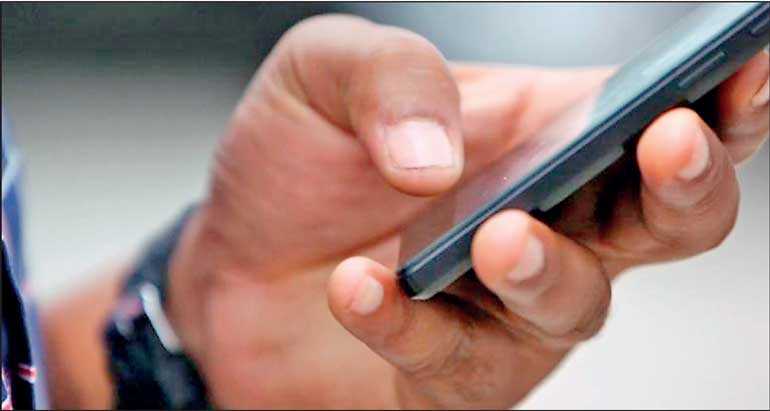Monday Feb 16, 2026
Monday Feb 16, 2026
Friday, 20 March 2020 00:00 - - {{hitsCtrl.values.hits}}

“The plot had all the elements of a big-budget thriller: Put an untested gene therapy technology in the hands of unscrupulous scientists. Make them soldiers of a greedy pharmaceutical company. Then give them the protection of a secretive and authoritarian Government that will stop at nothing to achieve  world domination.”
world domination.”
Popular rumours of this calibre circulated briefly on several social media platforms before Twitter shut down the ‘ZeroHedge’ account for violating its rules against “deceptive activity that misleads others”. But by then, it had been posted, shared or commented upon more than 9,000 times, according to the Digital Forensic Research Lab.
This is a time when humans are more interconnected than at any point in history. Misinformation is a worrisome consequence of any emerging epidemic because it is intertwined with conspiracy theories and those who believe them. And then there are the false claims about governments and celebrities and racial unrest – countries was covering up virus deaths, and the illness was spiralling out of control and the like. None of it was true.
Stamping out falsehoods about the coronavirus will require much more than blocking a Twitter account. Indeed, thanks to the way we are wired to process information about new and mysterious threats, it may be all but impossible, experts say.
Most of us are primed to give some credence to fibs we see or hear – the mental attitude that something is believable and should be accepted as true; and once we have done so, we’re loath to update our beliefs, even when offered alternatives that are true.
In fact, efforts aimed at debunking false information can wind up reinforcing them instead. That presents a serious challenge to the public health officials and the Government working to persuade panicked members of the public to remain calm.
It is very glaring indeed that some of the untruths about the coronavirus appear motivated by commercial interest. Others seem driven by ethnic suspicion and xenophobia – a fear of foreigners or strangers.
First, there were conspiratorial whispers on social media that the coronavirus had been cooked up as a bioweapon in a secret government lab in China to kill Uighur Muslims, or by the US to destroy the Chinese economy. The problem with conspiracy theories is that they often seem to have some whiff of truth, which makes them just plausible enough to be credible.
As the coronavirus spreads across the world, so too has misinformation about it, despite an aggressive effort by social media companies to prevent its dissemination. Facebook, Google and Twitter said they were removing misinformation about the coronavirus as fast as they could find it, and were working with the World Health Organization and other Government organisations to ensure that people got accurate information.
Surge of virus misinformation has stumped every social media. The posts include secret labs, magic cures, Government plots, etc. Despite efforts by social media companies to stop it, false information about the coronavirus is proliferating around the world.
A search by The New York Times also found dozens of videos, photographs and written posts on each of the social media platforms that appeared to have slipped through the cracks. The posts were not limited to English but in many languages as they could muster, reflecting the trajectory of the virus, as it has travelled around the world.
Security researchers have even found that hackers were setting up threadbare websites that claimed to have information about the coronavirus. The sites were actually digital traps, aimed at stealing personal data or breaking into the devices of people who landed on them.
The spread of false and malicious content about the coronavirus has been a stark reminder of the uphill battle fought by researchers and internet companies. Even when the companies are determined to protect the truth, they are often outgunned and outwitted by the internet’s liars and thieves.
We human beings have a tendency to things that support what we believe. Embracing and giving credence to those stories tends both to deepen our convictions and to prompt us to share them with others of like mind – in many ways, misinformation has a built-in advantage over the truth. These strong emotional responses can alter our judgments and lead us to make different decisions.
A person doesn’t have to believe every aspect of a conspiracy theory to keep it going. If just one component of the story jibes with one’s beliefs – a suspicion of China, say, or a conviction that drug companies would do anything for money – that could be enough to make that individual to want to share the story, and perhaps suggest some further plot twist.
The more tropes that can be woven into a conspiracy theory, the more chances it has to gain a following. The resulting ‘multiverse’ of believers makes it hard to destroy these conspiracy theories, because of continued repetition and repetition is often conflated with validity.
Correcting misinformation may work briefly, but the passage of time can taint our memories. Sometimes, all we take away from the correction is that there’s bogus information out there, so we are sceptical when presented with facts that are true.
Sometimes the effort to correct misinformation involves repeating the lie. That repetition seems to establish it in our memories more firmly than the truth, causing us to recall it better and believe it more. Psychologists call this the ‘illusory truth effect’. The illusory truth effect is the tendency to believe false information to be correct after repeated exposure. The effect rages like a wildfire, out of control, whether or not they are inclined toward believing conspiracy theories. The truth doesn’t change, but new falsehoods spring up every day. These are common short-term reactions to a sensational act of conspiracy-mongering.
Throughout this whole disastrous epidemic debacle, people have really liked conspiracy theories – our concern is “why is it that during epidemics people don’t choose to believe accurate scientific information?”
The proliferation of false and misleading stories about the coronavirus have contributed to a diminished trust among people in anything they read about the crisis; which includes true and well-sourced information. Experts are of the opinion that instead of just correcting false information, it is much more effective to replace it.
With the coronavirus still taking its greatest toll, people’s willingness to believe untruths about the virus has not reached crisis proportions. But if viral transmission begins, the tide of misinformation will keep on rising, unabated; and our confidence in what we know to be true – and in what we’re told is accurate – will be put to the test.